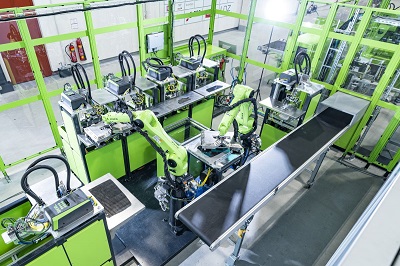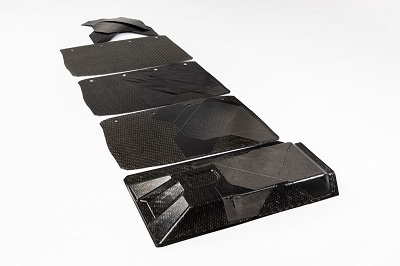With a wealth of injection molding experience and automation expertise, ENGEL develops highly cost-effective production concepts for the manufacture of composite parts. At China Composites Expo 2020 from 2-4 September in Shanghai, ENGEL is set to demonstrate the huge potential which high-volume series production offers, based on examples from the automotive industry. Thermoplastics-based solutions are this year's focus at the ENGEL stand.
ENGEL’s answer to the need for sustainable transport is organomelt. The well-developed process has already been deployed in high-volume manufacturing. The ENGEL organomelt process is used for fully automated production of front end carriers for Daimler and other products. Markus Fuchs, Director Business Unit Automotive Asia at ENGEL said that ENGEL is seeing great interest in the organomelt process from car manufacturers and tier 1 suppliers in China. He mentioned that for seat shells, consoles and interior structural components, for example, the integrated production process opens up the possibility of implementing lightweight design for high-volume vehicles in a cost-efficient way.

Load-compliant design of composite parts
In the organomelt process, thermoplastic fibre composite prepregs based on thermoplastic fabrics and unidirectional (UD) fiberglass or carbon fibre reinforced tapes are heated in infrared ovens specially developed for this technology. The thermoplastic composite material is brought into the injection mould by a robot, where it is formed and functionalized in a single step. Using injection moulding, reinforcing ribs or assembly elements, for example, can be over-moulded directly. This enables a highly efficient and fully automated manufacturing process, which in turn reduces the unit cost. In addition, using the thermoplastic approach throughout makes a contribution towards sustainability. It makes it easier to develop recycling strategies. Mr. Fuchs notes that returning composite components to the material loop at the end of their service life is one of the priorities for ongoing development in vehicle manufacturing.
Composite parts created using the ENGEL organomelt process combine a particularly light weight with excellent crash safety capabilities. As this process undergoes further development, ENGEL is working on the production aspects of load-compliant composite part design. In order to adapt the component geometry to the required lightweight properties, several different prepregs – for example, thermoplastic fabrics of different thicknesses or UD tapes – will in the future be combined for each component. ENGEL is using a door structure developed in partnership with automotive supplier Brose to clearly demonstrate the potential. Three thermoplastic fabrics with thicknesses between 0.6 and 2.5 mm are processed. The different loads on the individual component areas can be considered in an optimal way through a load-compliant selection of the organic sheets. For example, the door structure is more rigid in the window frame area than on the inside of the door.
Fit-for-purpose preforms in the injection cycle
As a system solution provider, ENGEL develops for its customers integrated and fully automated solutions for the entire process – from individual tapes through to functionalisation in the injection moulding process – from a single source. To be cost-effective in high-volume production, the processes of laying and consolidating the stacks (tape laying) must be inline and occur within the cycle of the injection moulding process. To allow this to happen, ENGEL combines a tape laying cell and a consolidation unit. The integrated process can manufacture fit-for-purpose preforms in a cycle time of just one minute.

In order to achieve the shortest possible cycle times, the tape laying cell developed by ENGEL relies on the pick-and-place principle with optical image processing. The individual tape layers are picked up, visually checked, placed in a controlled position and spot-welded together. ENGEL and its partner FILL (Gurten, Austria) have developed a production unit based on the heating/cooling principle for the consolidation process which follows immediately downstream. In a fully-automated process, this system consolidates the fibre stacks into a solid panel, while retaining thickness variations introduced in a targeted manner.
More efficiency for duromer systems
At China Composites Expo, ENGEL is using an example from the field of lightweight duroplastics design to demonstrate that production efficiency can still be improved – even for long-established technologies. The rear seat panel of the Audi A8 has a complex carbon fibre structure and local reinforcements. Series production is by a supplier from Germany using an ENGEL v-duo 1700 machine with the fully automated HP-RTM process.
The interdisciplinary ENGEL Lightweight Engineering team covers a broad development spectrum from the processing of thermoplastic preforms and duroplastic moulding compounds to reactive technologies. At its Center for Lightweight Composite Technologies in Austria, the machine manufacturer works on particularly economical composite solutions for the automotive industry and has been able to notch up several internationally significant milestones in collaboration with its development partners from industry and universities.
ENGEL at China Composites Expo 2020: Hall 2, Stand A2407














